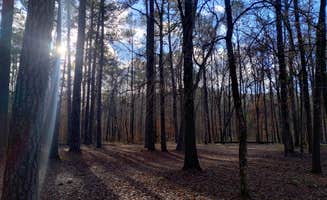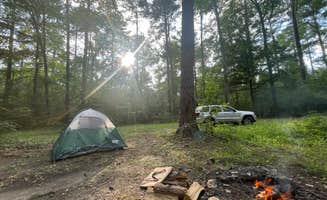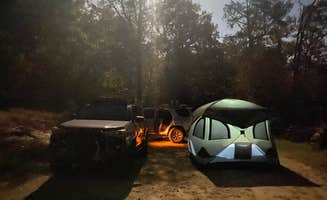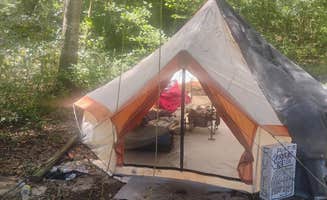Dispersed camping near Forsyth, Georgia centers on public lands managed by the Georgia Department of Natural Resources. The region features rolling Piedmont terrain with elevations ranging from 400-700 feet and mixed pine and hardwood forests typical of central Georgia. While many sites remain accessible year-round, spring offers optimal camping conditions with wildflowers blooming along the forest floor and temperatures averaging 60-75°F.
What to do
Fishing access points: Murder Creek Parking Area provides entry to fishing spots that remain productive throughout warmer months. "To be honest, this is a parking lot people use to park and walk the 200 feet down to the shoals and water cascades along Murder Creek," writes Steve S., noting the creek's recreational potential beyond just camping.
Wildlife observation: Ocmulgee River Camp offers opportunities to spot local wildlife in their natural habitat. One camper reported, "Saw some deer on a walk. It was quite hot but surprisingly not that buggy," demonstrating that even during warm conditions, wildlife viewing remains viable.
Seasonal hunting: Joe Kurz Wildlife Management Area accommodates hunters during designated seasons, though this affects camping availability. A visitor notes, "No cell coverage, has fire pit, mostly tent and car campers. I went with a travel trailer," indicating the primitive but functional setup for those combining hunting with overnight stays.
What campers like
Night sky viewing: Tyler Hunt Camp receives high marks for celestial observation opportunities. As camper LeeAnne T. describes, "It's quiet, super dark at night and beautiful. No amenities, you pack it in, you pack it out." The minimal light pollution creates exceptional stargazing conditions.
Solitude on weekdays: Ocmulgee River Camp provides relative seclusion, particularly during non-peak times. "Very nice a bit bumpy on the drive in but no major holes. Quiet and peaceful 2 neighbors great amount of space to find a nice spot," reports J A., highlighting the ample space between campsites.
Water features: The sound of moving water enhances several camping areas. At Murder Creek, "Besides the faint traffic noise that is mostly drowned out by the waterfall noise, this place was very quiet," according to a reviewer who appreciated the natural sound barrier the creek provides.
What you should know
License requirements: Most Wildlife Management Areas require documentation for overnight stays. At Rum Creek WMA, a camper advises: "Perfect for tent camping. Must have a hunting or fishing license or a land use pass," confirming that proper permits remain mandatory for legal camping.
Security considerations: Some locations experience unpredictable traffic patterns after dark. At Tyler Hunt Camp, one visitor reported: "As night fell, I began preparing for bed, but I noticed vehicles coming and going—at least three within an hour. Around 10 PM, a few Mustangs pulled up and sat for about 45 minutes." This highlights potential safety concerns at certain locations.
Weather variations: Temperature fluctuations affect camping comfort throughout the year. An Ocmulgee River camper noted, "It was nice and warm even in December! Almost 70 degrees!" though conditions can change rapidly between seasons.
Tips for camping with families
Noise expectations: Hunting activities create periodic disruptions in many areas. One camper at Ocmulgee River Camp mentioned: "Open spaces and very quiet this time of the year (January) train horn in the distance and gunshots in the distance as well from hunters here and there but all around a great spot to really enjoy."
Water recreation planning: During warmer months, creek access points become popular for swimming and cooling off. At Murder Creek, "I suspect in the summer this area is quite the hot spot with swimmers," suggesting families should arrive early to secure spots near water features during peak season.
Site selection strategy: Choose sites with natural boundaries to contain younger campers. At Ocmulgee River Camp, "Beautiful campsite, just a few neighbors, tons of flat space and a few fire pits," offers families room to spread out while maintaining supervision.
Tips from RVers
Access road assessment: Many dispersed camping areas require careful navigation. One camper at Ocmulgee River Camp mentioned it was "Only a mile off the road, which is a little bumpy but manageable," suggesting smaller RVs and trailers fare better than large rigs.
Clearance requirements: Low-clearance vehicles may struggle with certain access points. At Murder Creek Parking Area, "The lot probably does require a little clearance. So, a sedan may not be the best choice. That probably helps with traffic control on this road."
Space limitations: Most sites accommodate smaller RVs rather than full-size motorhomes. At Joe Kurz Wildlife Management Area, a visitor noted camping is "mostly tent and car campers. I went with a travel trailer," indicating smaller trailers can access the area despite limitations.





